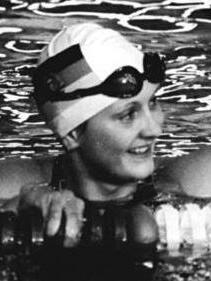1. Overview
Ines Geißler, also known by her married name Kaulfuss, is a prominent former swimmer from East Germany. Born on February 16, 1963, in Marienberg, Saxony, Geißler specialized in the butterfly stroke and freestyle swimming, achieving significant international success during the early 1980s. Her career culminated in a gold medal at the 1980 Summer Olympics in Moscow in the 200-meter butterfly event. This article examines her distinguished athletic career, her numerous achievements, and the broader historical context of sports in East Germany, including the controversies surrounding state-sponsored doping programs prevalent during her era, aiming to provide a balanced discussion of her legacy.
2. Life
Ines Geißler's early life in East Germany set the stage for her remarkable career as an elite swimmer. Her progression from a young talent to an Olympic gold medalist is a testament to her dedication and the rigorous training systems of the time.
2.1. Early Life and Background
Ines Geißler was born on February 16, 1963, in Marienberg, Saxony, a town then located in the Bezirk Karl-Marx-Stadt (now Chemnitz) within East Germany. Growing up in the structured environment of East Germany, Geißler was identified for her athletic potential early in her life, a common practice within the socialist state's extensive sports development programs. Her physical attributes, standing at 5.4 ft (1.64 m) tall and weighing 123 lb (56 kg), were well-suited for competitive swimming.
2.2. Athletic Career Beginnings
Geißler began her athletic career with the SC Karl-Marx-Stadt club. This club was one of the premier sports institutions in East Germany, known for nurturing top-tier athletes, especially in swimming. Under the club's guidance, Geißler developed her skills, focusing primarily on the butterfly stroke, which would become her signature event, alongside freestyle swimming. Her early training laid the foundation for her later successes on the international stage.
3. Major Achievements and Competitions
Ines Geißler's competitive career was marked by consistent dominance in butterfly events, particularly the 200-meter distance, across various major international championships.
3.1. Olympic Games
Geißler's most significant achievement came at the 1980 Summer Olympics held in Moscow, Soviet Union. There, she competed in the 200-meter butterfly event, securing the prestigious gold medal. This victory at the pinnacle of international sports solidified her reputation as one of the world's leading butterfly swimmers.
3.2. World Championships
Following her Olympic success, Ines Geißler continued her medal-winning streak at the World Aquatics Championships. At the 1982 World Aquatics Championships in Guayaquil, Ecuador, she demonstrated her versatility and dominance by winning two gold medals and one silver:
- Gold medal in the 200-meter butterfly, repeating her Olympic triumph in the event.
- Gold medal as part of the 4×100-meter medley relay team, showcasing her strength in team events.
- Silver medal in the 100-meter butterfly, proving her competitiveness in the shorter butterfly distance.
3.3. European Championships
Geißler also achieved considerable success at the LEN European Aquatics Championships, collecting multiple medals across different editions.
At the 1981 European Aquatics Championships in Split, Yugoslavia (modern-day Croatia):
- Gold medal in the 200-meter butterfly.
- Gold medal in the 4×100-meter medley relay.
- Silver medal in the 100-meter butterfly.
Two years later, at the 1983 European Aquatics Championships in Rome, Italy, she added to her medal haul:
- Gold medal in the 100-meter butterfly, improving upon her previous silver in this event.
- Gold medal in the 4×100-meter medley relay.
- Silver medal in the 200-meter butterfly, where she had previously won gold, still demonstrating strong performance.
Ines Geißler's consistent performance across these major competitions, particularly her repeated victories in the 200-meter butterfly, established her as a formidable force in international swimming during the early 1980s.
4. Personal Life
After her competitive swimming career, Ines Geißler became known by her married name, Kaulfuss. While details of her post-retirement activities and personal life are not widely publicized, her change of surname reflects a common aspect of personal life transitions after professional sports.
5. Assessment and Legacy
Ines Geißler's career as an East German swimmer presents a complex legacy, marked by significant athletic achievements alongside the enduring controversy surrounding the state-sponsored doping programs of her era.
5.1. Positive Assessment
Ines Geißler stands as one of the most successful butterfly swimmers of her generation. Her gold medal at the 1980 Moscow Olympics in the 200-meter butterfly was a career highlight, demonstrating her exceptional talent and dedication. She consistently replicated this success at both World and European Championships, accumulating a remarkable collection of gold and silver medals. Her ability to perform at peak levels across multiple international competitions over several years underscores her athletic prowess and the effectiveness of the rigorous training she underwent. Her achievements contributed to East Germany's dominant standing in international swimming during the 1980s.

5.2. Criticism and Controversy
Despite her undeniable athletic achievements, Ines Geißler's career, like that of many East German athletes from her period, is viewed within the broader historical context of systematic, state-sponsored doping. The East German sports system, known as State Plan 14.25, involved the compulsory administration of performance-enhancing drugs to athletes, often without their knowledge or consent, from the late 1960s to the late 1980s. While no specific allegations against Ines Geißler regarding direct involvement or knowledge of doping are detailed in available public records, her successes occurred within this highly controversial system.
This historical context raises significant ethical implications concerning the fairness of competitions and the validity of records set during that era. Critics argue that the achievements of East German athletes from this period, regardless of individual knowledge or complicity, were fundamentally tainted by the systemic doping. This perspective encourages a critical evaluation of the historical record and the legacy of athletes who benefited from such programs, even if indirectly. The debate reflects broader societal concerns about fair play, athletic integrity, and human rights, as many athletes suffered long-term health consequences from these illicit practices. Therefore, while Geißler's athletic talent is acknowledged, her legacy remains intertwined with the ethical complexities and historical evaluations surrounding the widespread doping in East German sports.